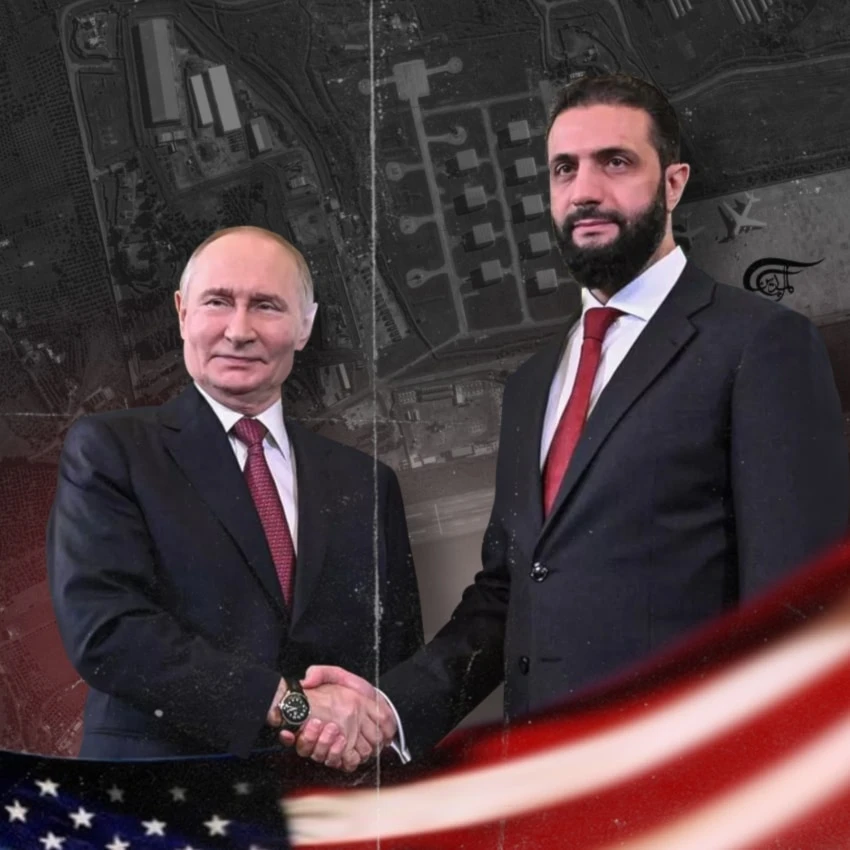The US presidential election through the prism of the war in Ukraine
Kurt Volker, former special representative of the US State Department for Ukraine during Trump's presidency, recently made a number of statements anticipating that Trump will not talk about compromises; he will simply demand that Russia withdraw its troops from Ukraine. This will be no different from the stance of the Biden administration.
-

Western aid for Ukraine will continue to be crafted in a way that will indebt not only Ukraine but also the countries of the EU. All of this is to the benefit of Western financial institutions. (Al Mayadeen English; Illustrated by Zeinab El-Hajj)
The November 5 presidential election in the United States overshadowed all other news reporting in Ukraine, including of the daily retreats by the Ukrainian armed forces along the front lines of the proxy war being waged by the NATO powers against Russia. Such extreme focus on a U.S. election is the consequence of Ukraine's now-complete dependence on the U.S. hegemon.
Ukrainians were doubly interested in the US election because they themselves are now completely deprived of the right to elect their national legislature (the Verkhovna Rada) and their national president. Volodomyr Zelensky's presidential mandate, stemming from the restricted election of April 2019, expired six months ago, while the electoral mandates also from 2019 of the deputies to the Rada expired five months ago.
Today, the policies of US ruling circles, irrespective of party affiliation, determine how many Ukrainians will live, how many of their cities will be damaged or destroyed, and whether an elderly man or woman will receive their pension or be able to heat their homes. Everything for ordinary Ukrainians now depends on the United States and the European powers aligned with it—the price of bread, how much forested lands will be clear-cut to benefit foreign firms, how much arable land (the country's principle patrimony) will be privatized and sold to foreign buyers, and the list goes on.
In order to pay for the war against Russia, more and more loans from Western financial institutions are being undertaken by the government in Kiev. At the same time, it is raising taxes and cutting vital government services such as education, health care and social welfare. This present war has been a downward spiral encouraged by the Western powers ever since the coup in Kiev in February 2014.
Today's crisis situation in Ukraine is the culmination of 33 years of failed 'independence'. In 1991, the Soviet republic of Ukraine ended its status as a constituent of the Soviet Union. It voted to secede from the union of Soviet Socialist Republics and embark upon a path of capitalist restoration. The vote began a long slide towards total economic and political dependence on the United States and the capitalist countries of the European Union. There was opposition by the Ukraine population to this political and economic course, but it was weak and in disarray at the beginning. Later, it was largely taken by surprise by the violence of the far-right in Ukraine. First, there was the violence of the 'Euromaidan' coup in February 2014, then followed the far right's fateful turn to civil war in the Donbass region in order to crush the anti-coup protest movement that arose there.
Crimea was the region of strongest opposition in Ukraine to the 2014 coup. This was due to the peninsula's unique history as an autonomous Russian and Soviet territory, and due to the fact that it had retained institutions of autonomous political powers after it was 'joined' to Soviet Ukraine in 1954 (with little popular consultation and no referendum vote). Opposition to the 2014 coup was slower to develop in Donbass because there were no autonomous political institutions to which the population could turn for protection--the tragic consequences of which would soon become evident.
Shifting allegiances to the US party in power
In 2014 and after, most of the Ukrainian political and economic elites favored a Democratic Party being in power in Washington. Republican Party supporters in Ukraine were in a clear minority. That began to change on January 6, 2021, when supporters of Donald Trump staged a riot in Washington DC to protest their loss in the presidential election two months earlier. Overnight, it seemed, most Ukrainian legislators became Trump supporters, believing that he would support and encourage a more aggressive stance against Russia. (As it turned out, the Democratic Party under Joseph Biden proved every bit as aggressive as his Trump predecessor.)
At the time, the varying factions of the Ukrainian elite were worried of the possibility of ongoing political turbulence and civil confrontation in the US. They feared this would cause the government in Washington to lose its attention on Ukraine and perhaps even begin reducing its financial support and weapons supplies.
Although US foreign policy never changes with a change of president, election moments can cause disruptions. Puppet leaders in overseas countries might step down in order to serve perceived public relations objectives in the U.S. or among its allies. Financial and military assistance may be shuffled in the interest of influencing electoral opinion domestically or abroad. The Ukrainian leadership is in a constant state of worry that this or that economic project or arms supply pipeline may be changed or canceled should an election in the United States upend an established political order.
Ukraine's leadership hoped that Kamala Harris would win the November 5 election and continue the Biden administration's policy of supplying Kiev with money and arms. As for Trump, Kiev was concerned about his election campaign rhetoric, including his claim he could quickly end the war with Russia should he win the election, and his insistence that elections take place in Ukraine. Trump has even mused about reducing new loans to Ukraine and demanding a harsh repayment schedule for previous loans already undertaken.
Back in June 2024, Zelensky proclaimed that Trump would be a 'loser president' if he imposed a bad peace agreement on Kiev. Today, Zelensky is begrudgingly congratulating Trump on his stunning election victory. On November 6, Marian Zablotskyy, a legislator from Zelensky's 'Servant of the People' election party/machine went further, servilely suggesting that a monument to Ronald Reagan be erected in Kiev and that a wall mural of Donald Trump be commissioned.
On November 7, Trump's name was deleted from the notorious 'Myrotvorets' website maintained by the neo-Nazi movement in Ukraine. The site is used to threaten and blacklist so-called 'enemies' of the country. It lists names and other personal information of targeted individuals in Ukraine and abroad, with nearly 200,000 names appearing on it, according to Wikipedia.
In April 2015, two Ukrainian journalists were assassinated after their names appeared on the list. The High Commissioner for Human Rights of the United Nations has called for a formal judicial investigation into the Myrotvorets backlist/kill list, but the website still operates freely.
Ukraine's online Strana news outlet wrote on November 7 that "pilgrims" from both the Ukrainian government and from other interested parties in the country are already traveling to Washington in order to establish contact with the Trump transition team and lobby for their particular interests.
So far, explains Kiev political scientist Pavlo Sebastianovych, money continues to flow to Kiev in huge streams, but ordinary Ukrainians or soldiers of the Ukrainian army receive little or none of it. "Ukraine is full of money," he writes. "The West is pouring some 40 to 50 billion dollars a year into the country without demanding anything in return. It just gives us this money. Funds are already promised and allocated for 2025. Officials will continue to bathe in the luxury; almost nothing is allocated for armaments. Our troops are fighting without weapons, and unarmed and poorly trained people continue to be mobilized and sent to the front."
Several months ago, Trump publicly criticized Zelensky for constantly asking for more funding for his war effort. Trump said back in September, "I think Zelensky is the greatest salesman in history. Every time he comes into our country, he walks away with $60 billion."
On November 6, Politico columnist Jack Detch reported that the Biden administration is rushing to deliver to Ukraine the last $6 billion tranche of aid already promised.
How to rename a failure into a 'success'
Volodymyr Zelensky told a press conference in late October that the Western powers will be reluctant to continue supplying Ukraine with weapons without seeing desired results on the battlegrounds. The Ukrainian Armed Forces have been steadily retreating for several months now. "It will be difficult for us to continue receiving large volumes of weapons and strong support from our partners. They want to see a really strong army fighting against the Russian occupier, then they will support us. This is a fact. Whether it is fair or not, timely or untimely, this is another question. The main thing they want to see is results."
According to Zelensky, the setbacks being suffered by the Ukrainian army are due to shortages of troops. His call for "results", then, is little more than a call for yet more of his administration's forcible conscription of men over the age of 25. What's more, members of his government are calling for the age of conscription to be lowered to 18, echoing such calls coming from officials in Washington.
Ukrainian journalist Vlasta Lazur at the Western government-financed Radio Liberty has written recently that Ukrainian servicemen have been banned from using the word "retreat" when talking to media. According to her, the servicemen have been ordered to use the words "victory" and "going forward" to describe Ukraine's ongoing military operations. They are forbidden to pronounce the word "retreat" or anything resembling it. Lazur reports the comment of one Ukrainian military officer, who asked tongue-in-cheek, "So I should now say we are advancing on Dnieper city?" Dnieper (renamed 'Dnipro' under Ukraine's policy of eradicating the Russian presence in Ukraine history) is the fourth largest city in Ukraine and lies well behind the lines of Ukraine's military front lines across Donbas, south and east of the Dnieper River.
Ukraine legislator Alexander Dubinsky writes that Kiev has only enough military conscripts and recruits to last another six to twelve months of war. Citing the New York Times, he writes that Ukraine will thus continue to get its hands on some one billion US dollars of aid per month, and they will not easily give up the prospect of the total six to 12 billion that the West will provide. But for the aid to continue flowing, it is necessary to create the appearance of success, at least in media reports and official statements.
To this end, Zelensky issued instructions in late October to create an additional military plan for 'victory', calling it an "internal victory plan", to be added to the 'victory plan' announced to the world one month ago.
The first point of the new plan is to counter 'disinformation', says presidential communications advisor Dmytro Lytvyn. "The first task is, of course, countering disinformation. The president has determined that controlling information is where everything starts. If the people of Ukraine do not understand what is happening, or if partners do not understand the position of Ukraine, then other points of a victory plan will be difficult to implement."
Lytvyn says the plan's second point is "to make the activities of the state understandable both for our people and for our partners."
In other words, the new 'victory plan' is solely concerned with information manipulation, attempting to deceive Western partners and domestic audiences by claiming everywhere that Ukraine is meeting successes on the front. Left unsaid is that in the age of social media and the Internet, it is difficult for the Ukraine government to hide the true state of affairs in its war. Ukrainian servicemen regularly report on social media the creeping collapse of Ukraine's war effort, one day on this front, the next day on that front. Hence the drive of Kiev's special civilian and military police services to strengthen their control over information.
Artem Dmytruk, a fugitive legislator from Zelensky's party, commented on the plan on Telegram on October 31, "They don't even hide it anymore: they announce to the whole country that they will either kill dissenters or torture them in basements. As for journalists and opposition politicians, we will send them to prison for treason. Broadcast media that does not obey the rules will be closed."
What Trump's election victory means for Kiev
Trump's pre-election statements on the conflict in Ukraine should be perceived primarily as rank populism. During his previous term as president, he encouraged the war against the people of Donbass that was initiated in 2014 by the coup regime in Kiev. This was five years before Zelensky came upon the scene, appearing to be critical of the war but continuing it once elected. Kiev was generously supplied with weapons by the Trump administration; indeed, it was Trump who in 2017 approved the first shipments of advanced missiles and artillery to Kiev.
Kurt Volker, former special representative of the US State Department for Ukraine during Trump's presidency, recently made a number of statements anticipating what Trump will do in Ukraine should he be elected president. Volker said Trump will not talk about compromises; he will simply demand that Russia withdraw its troops from Ukraine. This will be no different from the stance of the Biden administration.
According to Strana, the Republican Party during the previous Trump presidency was a 'war party'. Its nominees filled key positions in the State Department and were responsible for the war agenda for Ukraine. It was on their watch that the 2015 Minsk 2 peace agreement was ultimately betrayed and buried. Minsk 2 provided for a reintegration into Ukraine of the rebellious, anti-coup 'oblasts' (provinces) of Donetsk and Lugansk in the Donbass region, with a new, semi-autonomous status. Kurt Volker played a key role in the talks that produced Minsk 2.
The Trump-led Republicans have long criticized the Biden administration for allowing China and Russia to develop closer economic and political ties. Trump considers China to be the 'main' economic and military adversary of the US imperialists, so one of the features of any talks with Russia over Ukraine will be efforts to weaken Russia-China ties. A key goal would be to weaken the emerging BRICS bloc of countries (in which Russia and China happen to be playing leading roles).
Russia's Foreign Ministry explains that it has no illusions about Trump. He is "well known in Russia", says the Ministry. "The ruling US political elite, regardless of party affiliation, adheres to an anti-Russian stance and a policy of 'containing Moscow'. This policy is not subject to fluctuations in the domestic political climate in the US, whether it's the 'America first' agenda as interpreted by Trump and his supporters or the 'rules-based world order' on which the Democrats are fixated."
To this should be added the fact that historically, it has been Republican Party operatives who have acted as the main lobbyists for the US military-industrial complex, which is today one of the main beneficiaries of the war in Ukraine.
Ukrainian experts suggest that Trump will also seek to weaken the Russian Federation by lowering oil prices, using his good relations with the leaders of Saudi Arabia for this purpose.
"It is in Washington's interest to weaken the strategic alliance between Moscow and Beijing, if not to break it up altogether," commented the Ukrainian Telegram channel 'Rubicon' on Trump's election. "This is axiomatic. In a world made up of three geopolitical monsters, two cannot be allowed to unite against the third. The Democrats under Biden allowed this to happen and now they have lost everything, including power in their own country."
Nevertheless, it will be difficult to change anything drastically in this regard, as the processes that caused the war in Ukraine and led to Russia's rapprochement with China cannot be ignored or dismissed. The authors of 'Rubicon' also admit that the Trump administration will try to shift much of the burden of financing Ukraine and the NATO proxy war onto the shoulders of the leading countries of the European Union. This will only weaken the EU itself.
Western aid for Ukraine will continue to be crafted in a way that will indebt not only Ukraine but also the countries of the EU. All of this is to the benefit of the leading Western financial institutions.

 Dmitri Kovalevich
Dmitri Kovalevich
 15 Min Read
15 Min Read












